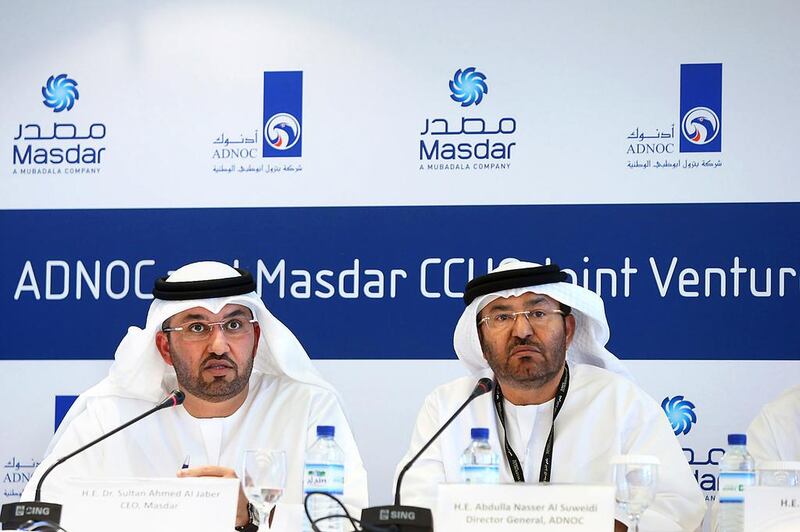Abu Dhabi National Oil Company (Adnoc) says it hopes to finish evaluating bids for its biggest onshore oil concession in three to four months.
Abdulla Nasser Al Suwaidi, Adnoc’s director general, said yesterday it was at the “early evaluation stage” of the bids submitted last month for the production rights to oilfields that pump a combined 1.5 million barrels per day, or half of the emirate’s daily output.
Prized for their size and position in the politically stable country, the oilfields are under a 75-year concession to western majors that expires in January.
Mr Al Suwaidi said he would not divulge any information so as not to jeopardise the non-binding evaluation process which would take three to four months.
Adnoc will send its recommendation to the Supreme Petroleum Council, the emirate’s top oil policy body that includes members of the ruling family and trusted technocrats.
Until a new concession takes effect in January 2015, Adnoc will become the sole-risk shareholder of the Abu Dhabi Company for Onshore Oil Operations (Adco), the current concession's joint-venture operator.
And foreign companies will not be able to lift equity oil or book reserves that in some cases represent as much as 10 per cent of their portfolio.
Mr Al Suwaidi said Adnoc had an agreement with the concession holders on the transition period.
“Adco will become Adnoc sole-risk until such time as the new agreement is approved,” he said.
The chief executives of the current concession holders have promised to keep supporting Adco with technical advice as well as their seconded employees.
“Everything has been done in a very clean and clear way by Adnoc,” said Christophe de Margerie, the chief executive of France’s Total. “All of the assets have been depreciated, so it’s over. It will start again when we go through the bidding process. Most people would like to see it moving quickly so [that] we avoid the transition period for too long.”
Companies have submitted bids for two options – 10 per cent and 5 per cent of the total concession. It is expected that Adnoc will retain a 60 per cent share.
The new concession will be divided into four blocks. The development of individual blocks will be led by one company, which would receive tax credits linked to its capital investment.
Adnoc aims to pump 70 per cent of the available oil reserves by 2055 – a target that is double that of the present industry norm.
Bob Dudley, the chief executive of Britain’s BP, said Adnoc was a good partner, and “we proposed what we feel is a very serious bid”.
“These are the crown jewels of Abu Dhabi and we take that commitment very seriously,” Mr Dudley said.
The contract, which is set to be the largest corporate deal awarded in the emirate's history, is a far greater attraction than nearby oil auctions in Iraq, according to Sean Korney, a partner at the oil-and-gas-focused law firm Baker Botts.
“This is going to be a big attraction for everybody,” Mr Korney said. “Iraq is a big attraction, but if you can get into a super giant field like this in Abu Dhabi or Iraq, you’re going to pick Abu Dhabi every time. It’s so much less above-ground risk.”
Energy ministers from Iraq, Oman, Angola, Sudan, India and the UK yesterday attended Adipec, the oil-and-gas conference that opened yesterday in the capital.
Gregory Barker, the British minister of state for energy, said: “We cannot rely on the fact that BP and Shell have been trusted partners for 80 years. The UAE is a crucial partner … It is not just about bringing their oil dollars. This is a relationship of equals.”
ayee@thenational.ae





